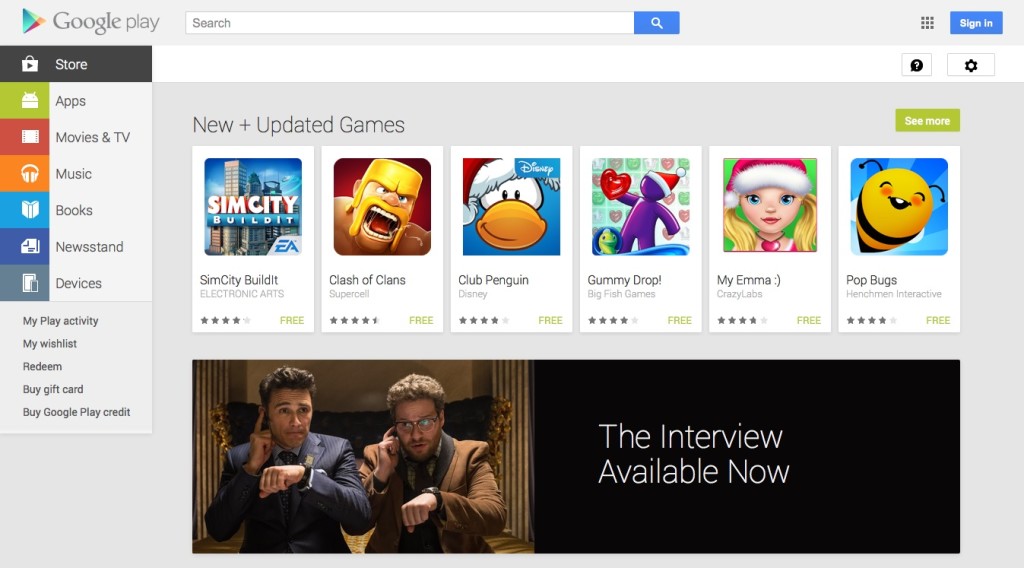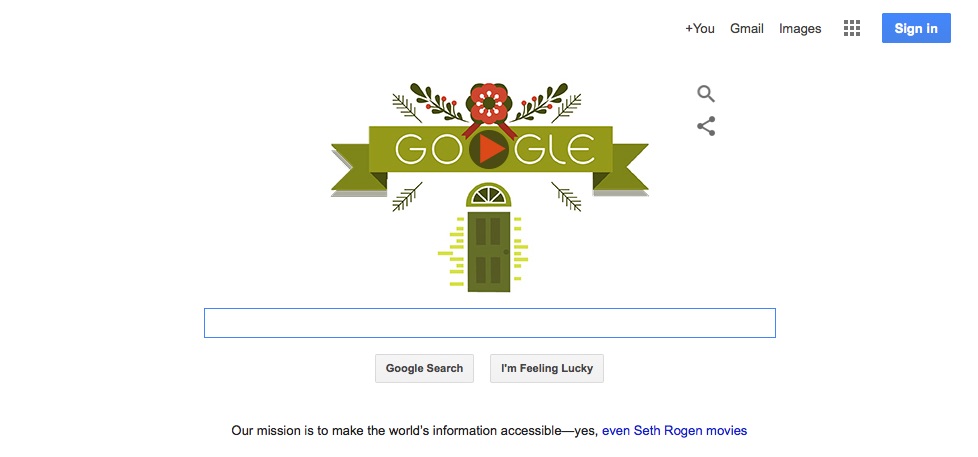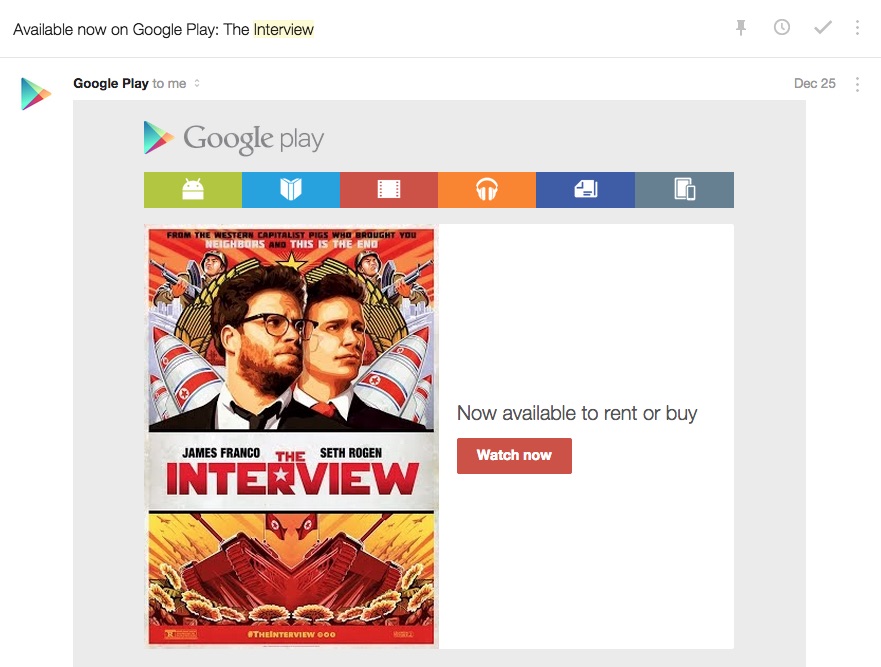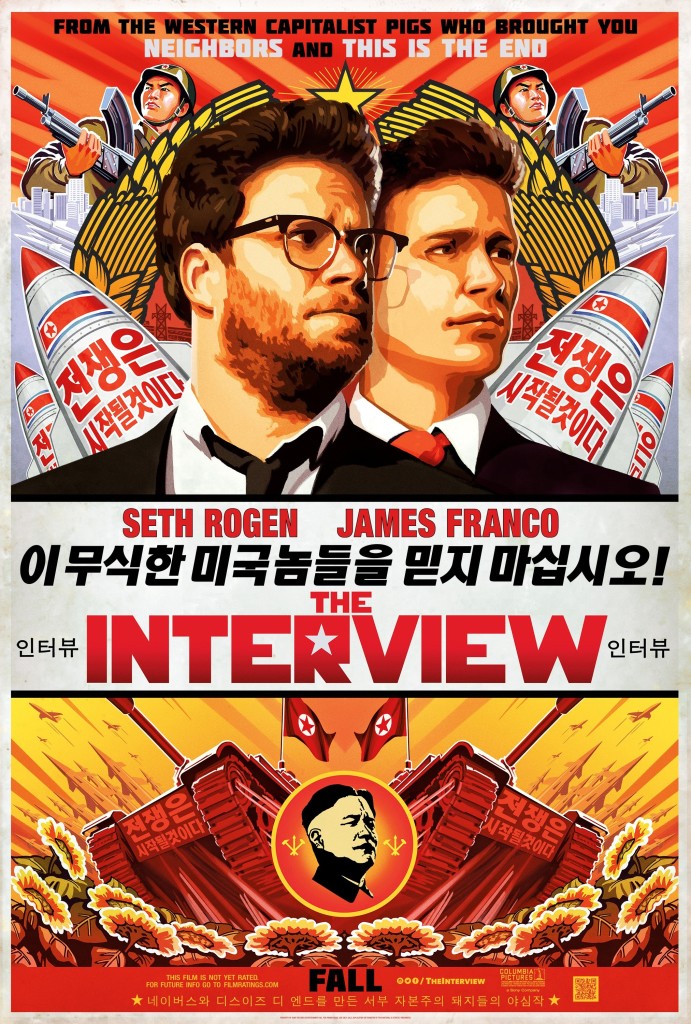The Motion Picture Association of America (MPAA) rates movies based on a variety of criteria and determines an acceptable viewing audience. According to FilmRatings.com (the MPAA rating site), The Interview, featuring Seth Rogen and James Franco, is rated as ‘R’ due to “pervasive language, crude and sexual humor, nudity, some drug use and bloody violence.” Due to the theme of the movie (assassinating a named political leader), Colombia Pictures and Sony Pictures Entertainment were in the news due to conflicts with North Korea over the movie.
This article isn’t intended to be a review of the movie, but instead an assessment of how it has been promoted, and what the impact has been.
Since its release, and up to the time of this writing, Google has been promoting The Interview in the Google Play store side-by-side with children’s games as shown below.
The Interview seems out of place with game titles like Club Penguin, Gummy Drop!, My Emma, and Pop Bugs. It’s like advertising cigarettes to children. In this case, it’s literally true since the film shows people smoking. There’s a legal disclaimer at the end of the film stating that the use of tobacco in the film wasn’t a paid endorsement (just a free one).
A Popular Genre of Cinema
There’s unarguably a popular genre of vulgar and gross teen comedy films like The Interview that have a cult following — even among adults. Just as comedian Sarah Silverman draws crowds of people to be entertained and offended by her shocking and often ‘inappropriate’ style of vulgar humor, films like The Interview are praised for their shock value and intentional offensiveness.
Such content seems to be increasingly in demand. Just as people pay to go on a roller coaster ride at an amusement park, people are equally willing to pay to be shocked by entertainment that is offensive. They want to be offended. This explains the popularity of films like American Pie, The Hangover, Jackass, Superbad, and others.
Problematic Promotion
However, the promotion of The Interview is problematic. First, the movie received world-wide attention by the news media. Capitalizing on this, Google is promoting the movie in a way intended to reach a wider general audience than these films are generally intended for. Of course, the original news stories weren’t part of the formal promotion of the movie (unless the news media was manipulated by the entertainment industry for promotional reasons).
Unlike a movie theatre where people can be easily ID’d prior to entering, or accompanied by an adult, streamed movies on the Internet are delivered to millions of homes with little or no restriction to who might viewing.
When you watch the movie, there is no clear rating declaration at the beginning. So, many viewers, young and old alike, who might otherwise avoid such content, will be lured into viewing the movie based on the trailer and numerous fluff reviews.
The Ramping Up Effect
The movie ramps up the levels of bloody violence, vulgarity, and nudity toward the middle and end, so that parents watching the beginning of the film to preview it will conclude that it’s typical teen humor.
Similarly, the average viewer will be drawn in as far as they are willing to go, and like the frog in the kettle, will find toward the end they are taking in images and content they might otherwise have avoided.
It may seem a little nit-picky to bring up such points. To those who are immersed in the violent visuals of today’s ‘first person’ video games and fully acclimated to vulgarity on television, in the movies, in music, and in comedy, The Interview probably seems fairly normal. To those who aren’t regularly exposed to that kind of content, the film probably seems inappropriate and culturally insensitive.
Lack of Targeted Promotion is a Disservice
Ultimately, Sony and Google do a disservice to the film and the genre by not limiting its promotion and release to a warm market. When this happens, reviews are skewed. Rather than having a film watched by and rated by the people who might most enjoy it and appreciate it, the film is released to people who aren’t acclimated to that particular brand of humor — and possibly never will embrace it.
The film is now being pushed to a world market, that’s already primed with interest, yet perhaps unaware that the movie contains crude humor and graphic bloody violence.
What’s unfortunate is that the film could have just as easily been produced in a way to meet PG-13 standards and been much more successful, and more widely appreciated.
Cultural Sensitivity and Global Response
At the time of this writing, the film has earned nearly $18M and is Sony’s top online film ever. (Source: NPR). So, American’s have spoken, and they’ve said, “We like this kind of humor, and indeed this kind of movie, more than anything else presently available.”
The film is perceived in the U.S. to be an act of demonstrating free speech, a criticism of North Korea, and in this case, a victory over those who would threaten to censor the film.
To foreigners watching the film, it is perceived as an example of American humor and the content produced by the U.S. film industry. It’s become our ambassador to world community (at least during its 15 minutes of fame).
Because of its content, the film serves to embolden those who advocate censorship of content from “the West.” In this regard, it provides an abundance of examples showing why anti-American jihadists should continue their struggle through war and censorship, concluding “If this is what America has to offer, we don’t want it.” The film is a Christmas gift to those who want to portray Americans as vulgar.
Google Blocked in China Days After Film Launch
While The Interview intends to be about North Korea, the potentially offensive jokes could just as easily be poorly received by people in other countries such as China, for example.
Drawing from bigoted caricatures, the movie pokes fun at portraying how Asians sound when speaking English. This is an outdated trope that is viewed by some as funny, but perceived by others as borderline offensive. At one point in the movie, someone holding a cute puppy proclaims, “Guess who’s going back to America where they don’t eat doggies?” Making fun of people with Asian accents, and making derogatory references to the animals eaten in Asian countries, might make some people laugh, but other people could very well take offense at these jokes.
It’s not surprising that only a few days after the heavy promotion of this film by Google on their search page, in the Play Store, and through a direct email campaigns. China has now blocked Google Gmail and Google’s search page.
The Search Page Campaign
Below is Google’s home search page as of Christmas morning. With the power of reaching approximately 210 million people every month (about 7 million people per day), Google chose to promote The Interview on Christmas day with a direct link to the streaming movie in their Play store. Click the image for a larger view.
The Email Campaign
The screen snip below shows an example of the direct email campaign launched by Google to promote the movie on Christmas day.
Disingenuous Disclaimer
At the end of The Interview, during the final moments of the credits, a legal disclaimer from Sony and the film’s affiliates states:
“The characters, incidents, and locations portrayed and the names herein are fictitious, and any similarity to or identification with the location, name, character or history of any person, product or entity is entirely coincidental and unintentional.”
You’ve got to be kidding me. So, it’s entirely coincidental that there’s a country called North Korea and political leader called Kim Jong-un. Did the producers really say, “Oh, really? Wow, we had no idea when making the film that these places and people actually exist! What a coincidence!”
That’s like someone slapping you in the face, and then saying, “Oh, I’m sorry. I didn’t realize I just slapped you in the face. (slap again) Was that your face? Oh, I’m sorry. (slap again).”
It would have been more sincere to say something like, “We intentionally spent millions of dollars making fun of another country’s leader, and joking about his assassination, and we knew full well we were doing it.” At least that would be honest. So, now we’re offensive and misleading. Great. This should generate lots of support and goodwill.
Movie Review of The Interview
This is likely a film that is destined to win the “Worst Movie Ever” and “Best Movie Ever” awards in the same year. For further reading, you can click here for a thoughtful movie review of The Interview.
Movie Poster
Below is the movie poster for The Interview.
North Korean Reaction
For those unfamiliar with the controversy surrounding the film, here is a brief excerpt from the Wikipedia page about the movie and North Korea’s response to it — which suggests they didn’t find the humor in the movie.
On June 20, 2014, Kim Myong-chol, an unofficial spokesman for the North Korean government, said The Interview “shows the desperation of the US government and American society … a film about the assassination of a foreign leader mirrors what the US has done in Afghanistan, Iraq, Syria and Ukraine.”[16]
On June 25, 2014, the Korean Central News Agency (KCNA), the state-run news agency of North Korea, reported that the government promised “stern” and “merciless” retaliation if the film were released, stating that “making and releasing a film that portrays an attack on our top-level leadership is the most blatant act of terrorism and war and will absolutely not be tolerated.”[17][18] The Guardian wrote that the film premise “touched a nerve inside the regime, which takes a dim view of satirical treatment of its leaders and is notoriously paranoid about perceived threats to their safety”[19] and that North Korea had a “long history of sabre-rattling and of issuing harsh threats that it does not act upon.”[20]
On July 11, 2014, North Korea’s United Nations ambassador Ja Song-nam condemned The Interview, saying that “the production and distribution of such a film on the assassination of an incumbent head of a sovereign state should be regarded as the most undisguised sponsoring of terrorism as well as an act of war.”[21] The Guardian remarked that his comments were “all perfect publicity for the movie.”[21] On July 17, 2014, the KCNA wrote to U.S. president Barack Obama, asking to have the film pulled.[22]
In August 2014, shortly after The Interview ’s release was delayed to December 25, it was reported that Sony had made post-production alterations to the film to reduce its insensitivity to North Korea. These changes included modifying the designs of buttons worn by characters, originally modelled after real North Korean military buttons praising the country’s leaders, and plans to cut a portion of Kim Jong-un’s death scene.[23]
Rogen predicted that the film would make its way to North Korea, stating that “we were told one of the reasons they’re so against the movie is that they’re afraid it’ll actually get into North Korea. They do have bootlegs and stuff. Maybe the tapes will make their way to North Korea and cause a revolution.”[11] Business Insider reported via Free North Korea Radio that there was high demand for bootleg copies of the film in North Korea.[24] The human rights organizations Fighters for a Free North Korea and Human Rights Foundation, which previously air-dropped offline copies of the Korean Wikipedia into North Korea on a bootable USB memory device,[25] plan to distribute DVD copies of The Interview via balloon drops.[26]
Update: 31 December 2014
As of 12:30 AM on 31 December 2014, Google has modified their promotion of The Interview in the Google Play store so that it is no longer listed adjacent to video games for kids. We applaud Google for their prompt corrective action in this matter.



